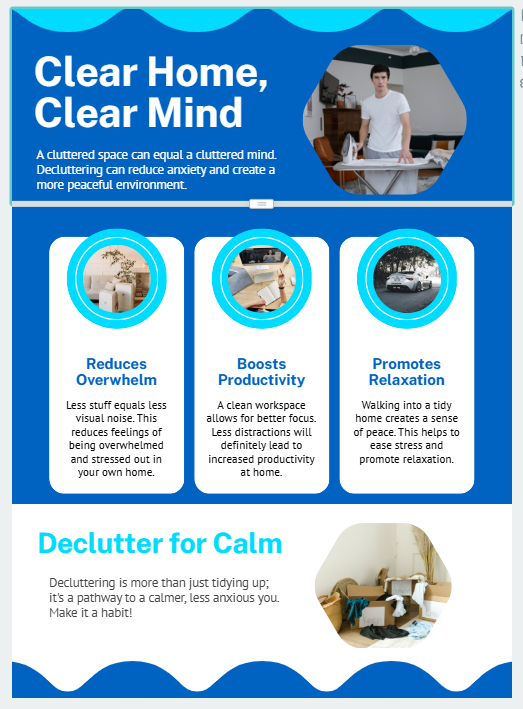Table of Contents
Have you ever walked into a room and instantly felt a wave of stress or overwhelm? Maybe it’s the pile of laundry, scattered papers, or the never-ending list of to-dos. Clutter can make us feel anxious, but it’s not just about being messy—it’s about your mind. Research shows that clutter can make us feel more stressed and anxious, and it can even lower our focus.
In fact, studies show that cluttered spaces can increase cortisol (the stress hormone) levels, making it harder to relax and focus. But here’s the good news: a clean and organized space can help clear your mind, boost your mood, and reduce anxiety. Services like spring cleaning not only refresh your home but also play a key role in creating a more peaceful and focused environment. Let’s dive into the science behind how decluttering your home can positively affect your mental health and make you feel calmer and more focused.

The Science Behind Clutter and Anxiety
Why Does Clutter Cause Stress?
Imagine walking into a room filled with scattered items, disorganized furniture, and papers everywhere. Your brain immediately starts processing these as unfinished tasks, causing stress and anxiety. This is because clutter is a visual reminder of things that need attention, which keeps your brain in a constant state of “work mode.” It’s a psychological burden that distracts you from being able to relax or focus.
This clearly shows how cleaning and decluttering can make you happy by reducing mental overload and creating a more peaceful space.
Research Statistics:
A study from UCLA found that women in cluttered homes had elevated cortisol levels, the stress hormone. The study revealed that cluttered environments caused participants to feel overwhelmed, leading to chronic stress. In fact, 54% of participants reported that clutter was a major source of anxiety in their lives. Source: UCLA
Further Insights:
The connection between clutter and anxiety is not just anecdotal—it’s scientifically proven. A study published in Psychological Science suggests that clutter overloads the brain and affects your working memory, making it harder to concentrate. Over time, living in a cluttered space can lead to chronic stress and anxiety, potentially contributing to other mental health conditions such as depression.
The impact of clutter on your mental health is also tied to your ability to focus and function. Research has shown that when you spend more energy focusing on your environment, you have less energy for other tasks—leading to frustration, exhaustion, and an overall sense of being overwhelmed.
Dr. Joseph Ferrari, a DePaul University professor, explains:
“Clutter prevents organizations from getting things done… when we declutter and get things organized I believe we lower that anxiety and we feel we have accomplished something.”
How Clutter Affects Your Mental Health
When your space is messy, your brain has to work harder to process everything around you. This leads to cognitive overload, making it harder to focus on the tasks that really matter. In contrast, when your environment is organized, your mind can focus on the present moment, leading to a sense of calm and clarity.
Elizabeth Earnshaw, LMFT, explains:
“Navigating clutter can lead to cognitive overload, which results in a stressed state that causes agitation, overwhelm, and mental shutdown.”
Emotional Effects:
Studies show that clutter can trigger feelings of helplessness. The more items you have to manage, the more mentally drained you become, especially when you know that there are more tasks to tackle. In fact, clutter is a leading contributor to decision fatigue—making small decisions becomes much harder when you’re surrounded by piles of things that need attention. By reducing the clutter, you help reduce mental strain, giving yourself the clarity to focus on what truly matters.
Better Mental Health:
When the clutter is cleared, you can experience a significant mental shift. Studies by the University of Minnesota found that people living in clean and organized spaces had fewer symptoms of anxiety and depression. It’s not just about having a nice living room or a well-organized desk—it’s about providing your brain with the room it needs to think clearly. When your environment is organized, your mental state improves as well.
The Power of Decluttering for Mental Health
Mental Clarity: Why Decluttering Helps You Focus
Decluttering is more than just cleaning—it’s about giving your mind the space it needs to function optimally. When you clear your environment of unnecessary items, it can help you feel more in control, reduce stress, and even increase productivity. It’s like creating a clean slate for both your home and your mind.
Mental Space and Focus:
When there is less clutter in your home, you have more space to think clearly. This mental clarity improves your focus on important tasks, making you more productive at work and in your personal life. One study found that a clutter-free environment improved cognitive function and problem-solving abilities by as much as 20%. (Source: National Library of Medicine)
Clutter isn’t just about physical items—it can also be mental clutter. In our fast-paced lives, we’re often juggling multiple thoughts, responsibilities, and concerns. Decluttering your physical environment can help free up mental space, allowing you to focus more on the present moment and make better decisions.
Physical Health Benefits:
A clean home supports physical health, too. When your space is organized, you’re more likely to keep up with other healthy habits, such as eating well and exercising. A clutter-free space encourages you to focus on what’s good for you, instead of becoming distracted by the mess around you. Living in a tidy space often leads to healthier life choices, such as cooking at home rather than relying on takeout.

Why Many AFL Players Have Decluttered Homes: Mental Health and Performance
Mental Health in Sports: Learning from the AFL
Just as we often overlook the impact clutter has on our mental health at home, many of us fail to recognize the toll that mental health challenges can have on professional athletes, especially those in high-pressure sports like the AFL. Athletes face immense challenges both physically and mentally. The pressure to perform, maintain peak fitness, and stay under the public spotlight can take a toll on an individual’s mental well-being.
Professional athletes are often expected to maintain a high level of mental and physical fitness. For AFL players, this means not only being in top shape physically but also managing the mental challenges of the sport. The emotional strain of competition, injuries, public pressure, and personal expectations can lead to high levels of stress and mental fatigue. Many athletes, including AFL players, turn to maintaining organized, clutter-free spaces to manage these pressures.
Why Decluttering Helps AFL Players Perform Better
In the AFL, where focus and mental clarity are crucial, many players keep their homes organized and clutter-free. By maintaining a tidy space, players create a peaceful environment where they can unwind after intense training sessions. This organization allows them to mentally recharge, giving them a clearer mind to focus on their game. A clean environment helps them cope with stress and performance pressure more effectively.
Mental Health in Sports: Why Athletes Need Mental Health Support
The idea that athletes are just physically fit without considering their mental well-being is changing. More and more professional sports leagues, including the AFL, are seeing the importance of supporting their players’ mental health.
Example from the NBA:
In the NBA, the mental health of players has been increasingly acknowledged, with many top athletes, like DeMar DeRozan and Kevin Love, publicly speaking out about their struggles. The importance of mental health awareness in sports is now being acknowledged by all major leagues. Just like physical injury prevention, mental health care is a crucial part of ensuring a player’s long-term success and well-being. The AFL could learn from this trend, implementing more robust mental health initiatives like a mental health awareness round.
A Personal Story: Simon Hogan’s Mental Health Journey
Simon Hogan, a former AFL footballer for the Geelong Cats, has been candid about his struggles with mental health. After retiring in 2012, he was diagnosed with a depressive disorder, which was later updated to bipolar affective disorder type 2. In an interview on The Lived Experience Podcast, Hogan shared his journey, discussing the challenges he faced and the importance of seeking help.
During the interview, Hogan emphasized the role of support systems in managing mental health. He mentioned that reaching out for help was a crucial step in his recovery process. “The hardest part was reaching out,” Hogan explained. “Once I did, it was a relief to talk and get support.” (Lived Experience Podcast)
While Hogan didn’t specifically mention decluttering his space, his story highlights the broader theme of creating supportive environments for mental well-being. Just as organizing one’s physical space can lead to a clearer mind, establishing strong support networks and seeking professional help are essential steps in managing mental health.
Why the AFL Should Launch a Mental Health Awareness Program
The Growing Need for Mental Health Support in Sports
The AFL has yet to officially launch a dedicated mental health awareness round, but experts and fans alike believe it’s time. In the fast-paced world of professional sports, athletes are often left to manage their mental health on their own, despite the immense pressures they face. Creating a Mental Health Awareness Round in the AFL would provide the necessary platform to discuss mental health openly and reduce the stigma associated with it.
The physical demands of sports are obvious, but the mental toll is just as important. Many players experience mental health challenges, such as anxiety, stress, and depression, which can affect their performance. A mental health program could give them the tools and support they need to maintain a healthy mindset both on and off the field. If you’re curious about the growing call for mental health awareness in sports, you can read more in this article by Bayside Psychotherapy on the importance of launching a Mental Health Awareness Round in AFL and sports.
According to Dr. Dawn Potter, PsyD from Cleveland Clinic:
“A clean and organized home helps people feel in control, reduces distractions, and alleviates stress and tension through even small acts of cleaning.”
Practical Steps to Declutter Your Home for a Clearer Mind
Start Small, Think Big
Decluttering doesn’t need to be overwhelming. Start with one small area—like a drawer or your desk—and work your way up. It’s easier to tackle a small task first and feel the sense of accomplishment before moving on to bigger areas.
The Three-Box Method
A great way to declutter is using the three-box method. As you go through your stuff, separate everything into three piles:
- Keep: Things you use and love.
- Donate: Things that are in good condition but no longer serve a purpose in your life.
- Toss: Anything broken, outdated, or just taking up space.
This method makes the process faster and helps you make decisions without feeling stuck.

Organize Your Space by Zone
Another useful technique is organizing your home by zones. You can break your home into sections, such as:
- Work zone (desk, office area)
- Relaxation zone (living room, reading nook)
- Sleep zone (bedroom, bed)
- Activity zone (gym, yoga corner, etc.)
Each zone has a specific function and should be organized according to its use. Having defined zones makes it easier to manage clutter and keeps your mental space clear.
Declutter One Room at a Time
If you feel overwhelmed by your entire home, focus on one room at a time. For example, start with the living room or kitchen—places where you spend a lot of time. Once you feel the benefits of a decluttered space in one room, it’ll motivate you to continue organizing the rest of your home. Gradually, your whole environment will feel more peaceful.
Consider Digital Decluttering
In today’s world, clutter isn’t just physical—it’s digital too. From overflowing email inboxes to chaotic digital file systems, our phones and computers can also contribute to mental clutter. A great way to declutter mentally is to tidy up your digital space by organizing your files, unsubscribing from unnecessary emails, and cleaning up your phone’s home screen. Taking care of your digital life can help reduce stress and free up mental space.

How a Decluttered Home Can Improve Your Well-being
Mental Clarity and Peace of Mind
Decluttering your home helps you feel more at peace. A clean environment reduces distractions, making it easier to relax and focus. When your home is organized, you can concentrate better, and your stress levels go down. This can lead to more productive and fulfilling days.
Better Relationships and Social Connections
A clean home is more welcoming. When your space is tidy, you’re more likely to invite friends and family over. This helps you create and maintain healthy relationships. Socializing and spending time with others are important for good mental health.
Better Sleep and More Energy
Did you know that a clean home can help you sleep better? When your bedroom is tidy, it’s easier to wind down and relax at night. You’ll sleep better and wake up feeling refreshed. Plus, you’ll have more energy throughout the day because your environment supports a calm, healthy mind.
The Ripple Effect: Why Decluttering Matters for Your Mental Health
Building a Healthier, Happier Life
Decluttering does more than just help you organize your space—it helps you build a healthier, happier life. When your home is tidy, you’ll feel less stressed, more focused, and more energized. Your physical and emotional well-being will improve, making it easier to take care of yourself and others.
Ongoing Benefits of Decluttering
Decluttering is a habit, not just a one-time thing. By regularly keeping your space organized, you’ll continue to feel less stressed and more in control. This lifestyle change supports long-term mental health and happiness.
Final Thoughts
Decluttering your home is more than just tidying up—it’s an important step in taking care of your mind. By creating a peaceful, organized environment, you’re actively supporting your mental health, just as AFL players could benefit from launching a mental health awareness program. Mental well-being is just as important as physical health, and keeping your space tidy is an easy, practical way to support your mind.
In fact, professional cleaning services can make this process even more effective by thoroughly transforming your space and relieving you of the stress that comes with deep cleaning tasks.
Take the first step today—clear out that drawer, organize your desk, and enjoy the mental clarity that comes with a tidy space. Your mind—and your home—will thank you.
Regular Cleaning You Can Count On
Stay ahead of the mess with scheduled cleaning that keeps your home looking great all the time. With Dirt2Tidy, enjoy reliable service, trusted cleaners, and consistent results — every visit.
✅ Weekly, fortnightly, or monthly cleans
✅ Friendly, police-checked professionals
✅ Affordable and flexible plans
👉 Start your regular cleaning service today!
📞 1300 789 178 | 🌐 Book Online in Minutes
✨ Make clean living your new normal.







